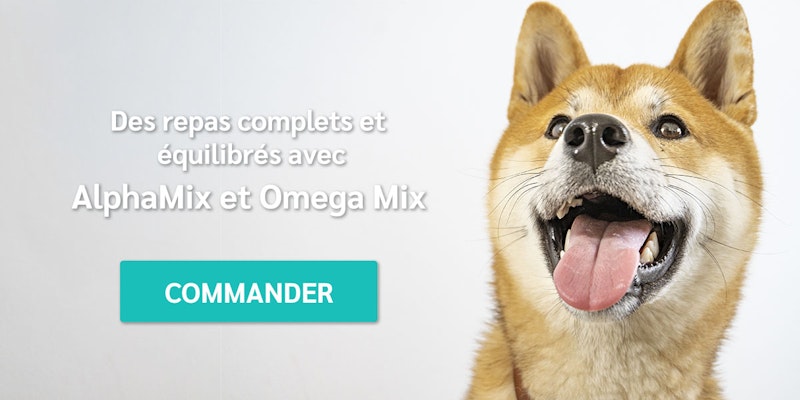For a household ration to be complete, it must contain food in the right proportions: At least 50% protein, fibre, some carbohydrates and fat.
But what about micronutrients? Because they are invisible, many people do not think about these essential elements in the composition of their recipes. Focus on these frequently forgotten vitamins and minerals.
Most common mistakes in meal preparation
Errors in the energy supplied:
- When your dog absorbs too many calories, it increases the risk of being overweight and obesity. Know that it only takes 2 or 3 extra kilos for your dog to increase the risk of diseases such as diabetes, herniated discs, osteoarthritis, heart failure, etc.
- If, on the contrary, you give him too few calories, this has a direct impact on the loss of muscle mass, increased sensitivity to parasites, but also on the growth of puppies.
Errors in macronutrient composition: It is important to adapt the dog's diet to his age, his level of physical activity, as well as lifestyle, etc.
For example, a deficiency of proteins and essential amino acids leads to muscle loss as well as an increase in body fat, and increases death rate, anaemia, poor healing, etc. Too much carbohydrate intake such as rice or potatoes causes an increased risk of obesity, diarrhoea or even hyperglycaemia.
Errors in micronutrient composition:
Many people tend to forget about vitamins and minerals simply because they can't see them or because they downplay their importance. However, most of these micronutrients are essential for the dog because he is not able to produce them himself. One of the biggest risks when preparing household rations is the lack of calcium combined with too much phosphorus.
Consequences and risks:
- Bone decalcification
- Osteopenia
- Deformation of bones and jaw
What are minerals and vitamins used for and why are they important?
Essential vitamins for dogs:
Play a role in the formation of red blood cells, in metabolism and energy production in the body, quality of skin and intestinal barriers, vision, calcium homeostasis, a healthy skeleton, blood clotting and have an antioxidant effect. Therefore, vitamins B, A, D, K and E respectively are essential for the dog's health.
Did you know? Unlike humans, dogs are not able to metabolize vitamin D due to their coat. So they must imperatively find it in their food.
Minerals:
Are important for the body and have a function in blood pressure, skeleton, normal function of enzymes, metabolism, thyroid functioning, transport of oxygen by red blood cells, skin quality and muscle contraction. Minerals are found in soil, plants, vegetables and fruits, but also in the organs and bones of prey.
What is a mineral vitamin supplement or MVS?
It is a supplement that contains both minerals and vitamins and is 40% ash.
The goal of a MVS is to meet the dog's daily needs in terms of:
- Calcium,
- Optimal intake of Calcium / Phosphorus,
- Sufficient daily intake of minerals and vitamins.
For optimal health
As you will have understood, to ensure the daily intake necessary for your dog, it is important to incorporate the right amounts of proteins, carbohydrates, fibre, fats and micronutrients.
Did you know? By creating your free account on Dogocook, you have access to thousands of recipes perfectly suited to each case, thanks to our powerful calculator.
Regarding minerals and vitamins, it is possible to easily remedy deficiency problems by adding supplements such as Alpha Mix and OmegaMix to the household ration.
Conclusion:
- A perfectly balanced diet reduces the risk of deficiencies or excesses and the resulting diseases
- Micronutrients (vitamins and minerals) are invisible but nevertheless essential, so they should not be underestimated
- Dogocook is a free tool that allows you to create custom recipes in two clicks
- You can find mineral-vitamin supplements in our eshop.


